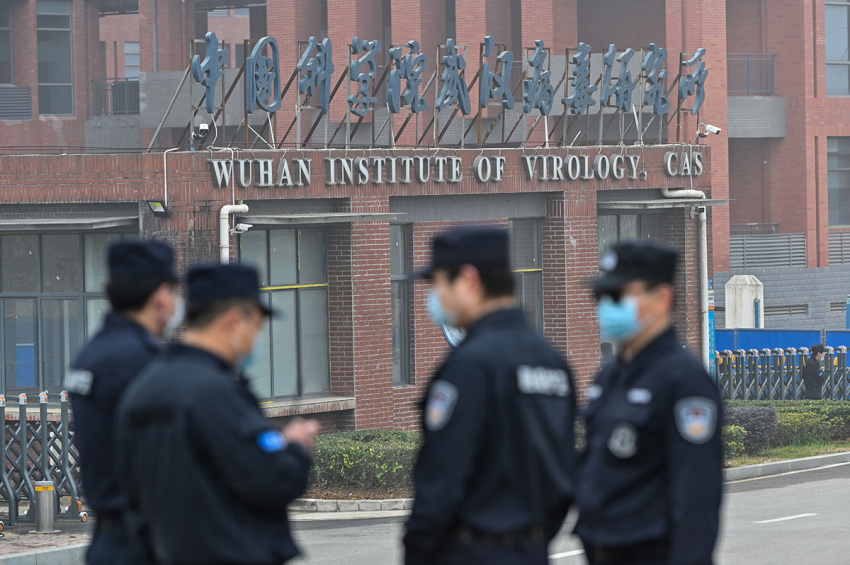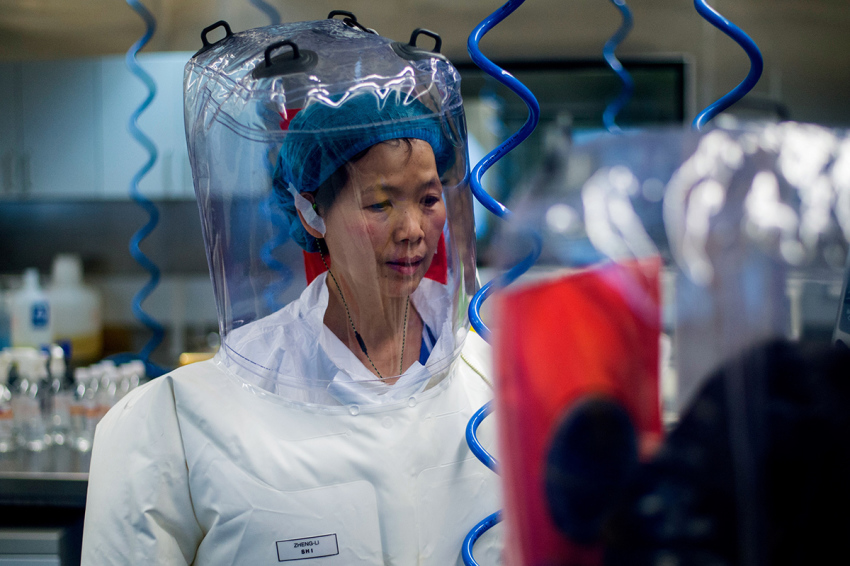'I am not being muzzled': Fauci's emails reveal candid response to media's Trump censorship claims

Dr. Anthony Fauci shot down claims that he was being “muzzled” by the Trump administration during the initial months of the COVID-19 surge, according to emails released this week.
Thousands of pages of emails sent to and from Fauci, director of the U.S. National Institute of Allergy and Infectious Diseases, who was also part of the Trump administration's coronavirus task force, were obtained through Freedom of Information Act requests by BuzzFeed News and The Washington Post. Among the emails was a response from Fauci who dismissed claims that he was being “muzzled” by the Trump administration.
In one email dated March 2, 2020, Fauci denied being censored from speaking out about the pandemic when he was asked if it was true that the Trump administration controlled his speech, as was reported at the time.
When then-President Donald Trump appointed former Vice President Mike Pence to oversee the government’s response to the pandemic, some believed Fauci’s scientific opinion was being silenced.
“I have been very explicit in stating publicly that I am not being muzzled or censored,” Fauci wrote in an emailed response.
“I say exactly what I want to say based on scientific evidence, I have stated this on multiple TV programs over the past few days including at a major press conference with many, many reporters present including several TV cameras,” Fauci continued. “Could not possibly be more public about this. No censor. No Muzzle. Free to speak out.”
On April 15, 2020, Fox News' Bret Baier reported that multiple sources believed the novel coronavirus outbreak originated in Wuhan lab where patient zero was infected. These sources also said that the World Health Organization was complicit in covering for China.
That same month, Fauci repeatedly said that the virus was not man-made and was the result of an“unusual human-animal interface” in a Chinese “wet market” and that “the mutations that it took to get to the point where it is now is totally consistent with a jump of a species from an animal to a human.”
Peter Daszak, a zoologist and president of the EcoHealth Alliance, sent an email to Fauci on April 18, 2020, thanking him for "stating that the scientific evidence supports a natural origin for COVID-19 from a bat-to-human spillover, not a lab release from the Wuhan Institute of Virology.”
The EcoHealth Alliance had received an NIH grant and used those funds to study coronaviruses in Chinese bats and gave $598,000 to the Wuhan lab from 2014–2019. Under the Trump administration, the NIH subsequently canceled a five-year $3.7 million grant for EcoHealth Alliance, saying it didn’t believe the work aligned with “program goals and agency priorities,” according to The Wall Street Journal.
Questions surrounding the origins of the COVID-19 outbreak have resurfaced in recent months after State Department documents revealed that a month before the first confirmed case of COVID-19, three researchers working in China’s Wuhan Institute of Virology (WIV) were hospitalized after becoming sick in November 2019.
This has reignited interest in investigating the origins of the COVID-19 virus to find out if it escaped from the laboratory.
The fact sheet released by the State Department during the final days of the Trump administration said several researchers at a lab who studied coronaviruses and other pathogens became sick “with symptoms consistent with both COVID-19 and common seasonal illness,” the Journal reported.
Sen. Tom Cotton, R-Ark., who was among the first to raise concerns about the virus' origins coming from the Wuhan lab, responded to the corporate media's sudden about-face after reporting for over a year that such claims had been debunked and were nothing more than a conspiracy theory.
“The common-sense case for a lab leak is the same as it was in January 2020, when I first mentioned the possibility,” Cotton tweeted on May 24.
“Isn’t it strange that this once-in-a-century bat coronavirus pandemic just happened to emerge within a few miles of China’s biggest laboratory researching bat coronaviruses? Shouldn’t we at least look at that lab?” Cotton asked.
Three Wuhan lab researchers went to the hospital with COVID symptoms in November 2019—a month before the first confirmed case of the disease.
— Tom Cotton (@SenTomCotton) May 25, 2021
It’s time for the Chinese Communist Party to come clean about what happened at that lab.https://t.co/7XZrLRCBFH
The Republican senator cited a Hudson Institute event on the origins of COVID-19 and said evidence of a lab leak “has been building for months” due to the “lax safety conditions at Wuhan Institute of Virology,” “similarities between research at the lab and features of the virus” and “patents for bat cages and other live-animal research tools filed by WIV.”
“The lab-leak hypothesis was always reasonable, but reporters & activists in white lab coats nonetheless spent the better part of a year denouncing it as a ‘conspiracy theory.’ They were wrong,” Cotton continued in the Twitter thread.
Cotton called for “truth” and accountability,” as well as a “full, impartial investigation into COVID-19 origins, with a special focus on the Wuhan labs.”
“If we want closure in the aftermath of this pandemic — and if we want to avert the next one — we must learn about its origin,” Cotton added in an op-ed for Fox News. “That means we must look at the lab in Wuhan and the experimental research its scientists performed.”

Following the Journal’s report about the three WIV researchers being hospitalized in November 2019, the Senate unanimously approved a bill last Monday introduced by Sens. Josh Hawley, R-Mo., and Mike Braun, R-Ind., to require the federal government to declassify all information linking China’s WIV and COVID-19, Forbes reported.
President Joe Biden said in a statement released on May 26 that the U.S. intelligence community has “‘coalesced around two likely scenarios’ but has not reached a definitive conclusion on this question” regarding the origins of COVID-19.
Biden reportedly asked the intelligence community in March to prepare a report on the origins of COVID-19, “including whether it emerged from human contact with an infected animal or from a laboratory accident.”
Biden has since asked these agencies to “redouble their efforts to collect and analyze information that could bring us closer to a definitive conclusion” and report back to him in 90 days.
China's communist regime initially claimed that the deadly virus originated at a wet market in Wuhan, the epicenter of the outbreak, but there was much speculation surrounding that claim.
White House Press Secretary Jen Psaki advised Americans not to jump to conclusions on the origins of the virus before the international investigation is completed, Breitbart reported.
“What we can’t do, and what I would caution anyone doing, is leaping ahead of an actual international process,” Psaki said last Monday. “We don’t have enough data and information to jump to a conclusion at this point in time.”
A World Health Organization report released in March claimed the coronavirus likely emerged from bats and is “extremely unlikely” to have emerged from a laboratory leak, NBC News reported at the time.
More than a year after the first infections were detected, WHO staff investigated the WIV and visited a market in Wuhan in February, the Journal reported.
Some have raised concerns about gain-of-function research at the Wuhan lab and other locations worldwide. Gain-of-function research occurs when an organism or disease is altered in a way that increases its transmissibility or when naturally-occurring animal viruses are altered to infect humans.
During a Senate hearing in May, Fauci said the National Institutes of Health had never directly funded this type of research at the Wuhan lab when Sen. Rand Paul, R-Ky., asked if Fauci supports the NIH funding that lab.
Last Tuesday, the Senate passed an amendment by Paul that would permanently ban any U.S. funding for gain-of-function research in China.
“We don’t know whether the pandemic started in a lab in Wuhan or evolved naturally,” Paul said in a statement on the Senate floor. “While many still deny funding gain-of-function research in Wuhan, experts believe otherwise. The passage of my amendment ensures that this never happens in the future. No taxpayer money should have ever been used to fund gain-of-function research in Wuhan, and now we permanently have put it to a stop.”
Senate Amendment 2003 banned the National Institute of Health and U.S. agencies from funding gain-of-function research in China, but this amendment defines gain-of-function as “any research project that may be reasonably anticipated to confer attributes to influenza, MERS, or SARS viruses such that the virus would have enhanced pathogenicity or transmissibility in mammals.”
In the recently released FOIA emails, Fauci exchanged messages with staff from January to June 2020, when the pandemic was first emerging in the U.S.
In an email from Fauci to Lawrence Tabak, principal deputy director of the NIH, sent on Feb. 1, 2020, the title of an attached PDF included the phrase, “SARS Gain of function.”
Fauci also sent an email to Hugh Auchincloss, NIAID principal deputy director, with the same document attached to it and said it was essential for them to speak that morning, instructing him to read the attached paper.
Emily Wood is a reporter for The Christian Post. She can be reached at: emily.wood@christianpost.com



























